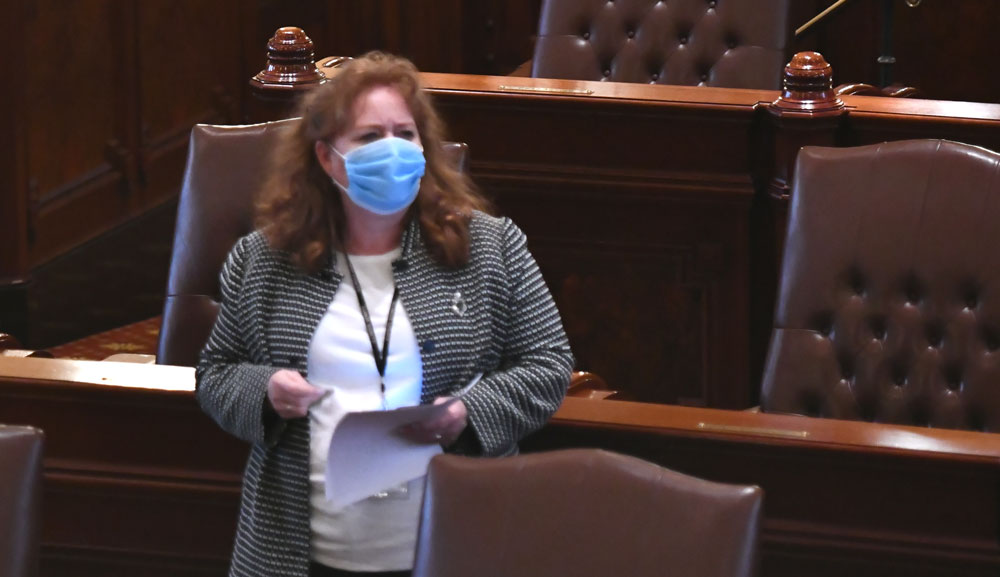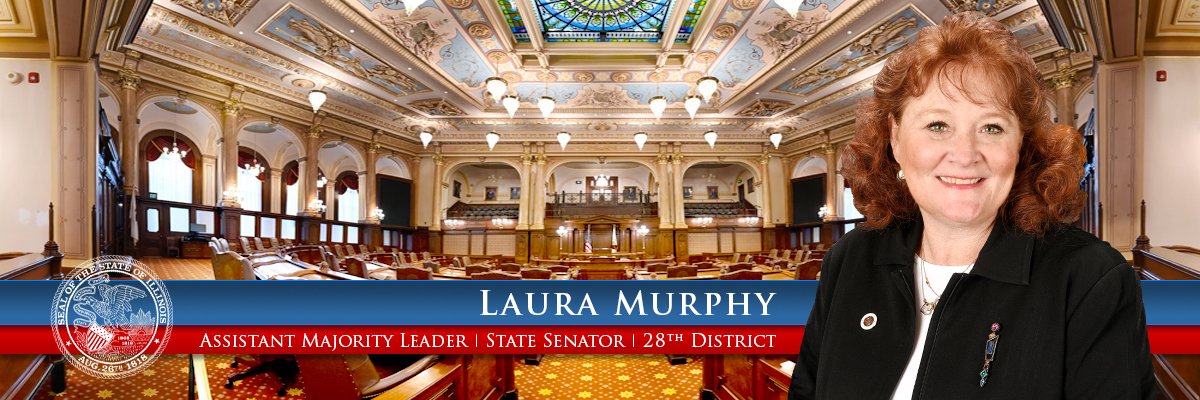- Details
 DES PLAINES – To help older adults stay connected to their community and spread cheer safely this holiday season, State Senator Laura Murphy (D-Des Plaines) is collecting holiday cards to deliver to the residents at local long-term care facilities.
DES PLAINES – To help older adults stay connected to their community and spread cheer safely this holiday season, State Senator Laura Murphy (D-Des Plaines) is collecting holiday cards to deliver to the residents at local long-term care facilities.
“We may not be able to visit our older neighbors in person this year, but we can still show them we care,” said Murphy. “A handwritten note or card is a great way to help those living at long-term care facilities get into the holiday spirit.”
Murphy is encouraging residents of the Northwest Suburbs to write cards, which can be homemade or store-bought, to help bring joy to older adults who may be feeling lonely or isolated during the holidays. Children are also invited to participate.
“It only takes a few minutes, but a heartfelt holiday greeting can make all the difference to someone who may be struggling during this challenging time,” said Murphy. “Your kind words could bring a smile to a neighbor’s face.”
Cards can be delivered to Murphy’s office through Friday, Dec. 18:
State Senator Laura Murphy
880 Lee St. Suite 100
Des Plaines, IL 60016
Cards can be dropped through the mail slot. For more information, contact Murphy’s office at 847-718-1110 or visit www.SenatorLauraMurphy.com.
- Details

DES PLAINES – To help patients in need of donated blood and support efforts to find an effective treatment for COVID-19, State Senator Laura Murphy (D-Des Plaines) is hosting a blood drive Tuesday, Dec. 8 from 2 to 6 p.m. at the Prairie Lakes Community Center, located at 515 E. Thacker St. in Des Plaines.
“At the beginning of the pandemic, blood donations hit a critical low, putting thousands of Illinoisans at risk,” Murphy said. “Now, blood donation is even more important, as researchers think it may have potential as a COVID-19 treatment. I urge anyone who is able to donate to make an appointment.”
All successful blood donations will be tested for COVID-19 antibodies. Researchers hope blood containing antibodies—also known as convalescent plasma—may help treat people with severe COVID-19 by boosting their ability to fight the virus.
The Centers for Disease Control and Prevention estimates about 17.2 million units of blood are used in transfusions every year for accident victims, cancer patients, hemophiliacs, surgery patients and more. In March, the CDC issued a statement encouraging healthy people to donate blood at blood centers that adhere to public health and safety guidelines.
Murphy has partnered with Versiti Blood Center of Illinois to host the event. To ensure the safety of all staff and donors, masks will be required.
Appointments are preferred, but walk-ins may be accommodated. To schedule an appointment to donate, visit http://bit.ly/BloodDrive-12-8-20.
- Details
 SPRINGFIELD – State Senator Laura Murphy released the following statement regarding the postponement of the upcoming General Assembly veto session:
SPRINGFIELD – State Senator Laura Murphy released the following statement regarding the postponement of the upcoming General Assembly veto session:
“I’m disheartened to learn we will not be able to move forward on the legislation we’ve been working on, but especially given recent surges in COVID-19 cases and hospitalizations across the state, postponing veto session is the most responsible choice.
“With many regions experiencing peaks even higher than we saw in the spring, convening the General Assembly could contribute to the spread of the virus both in Springfield and in legislators’ home communities.
“Although we won’t be in the Capitol, the work doesn’t stop. I plan to continue negotiating with my fellow lawmakers to find ways to support working families, improve higher education, and keep Illinoisans in Illinois.
“When we return to Springfield, I look forward to hitting the ground running.”
- Details
 DES PLAINES – The open enrollment period is now underway for health insurance coverage through the Affordable Care Act Health Insurance Marketplace, and to help Illinoisans navigate their coverage options, State Senator Laura Murphy (D-Des Plaines) is hosting a live Q&A with Get Covered Illinois on Tuesday, Nov. 10 at 7 p.m. via Zoom.
DES PLAINES – The open enrollment period is now underway for health insurance coverage through the Affordable Care Act Health Insurance Marketplace, and to help Illinoisans navigate their coverage options, State Senator Laura Murphy (D-Des Plaines) is hosting a live Q&A with Get Covered Illinois on Tuesday, Nov. 10 at 7 p.m. via Zoom.
“Especially during a pandemic, it’s critical to have a dependable health insurance plan that fits your needs,” Murphy said. “Get Covered Illinois offers helpful tools and one-on-one assistance to help make the enrollment process as smooth as possible.”
Open enrollment runs through Dec. 15. This year, Illinoisans will be able to choose from 179 plans from eight insurance providers. There are also tax credits available to help lower-income residents reduce their monthly payments and find affordable coverage.
Last year, more than 240,000 people received tax credits, and after credits were applied, the average monthly payment was $153.
“Health care costs can have a huge impact on a family’s budget, and a lack of coverage can be catastrophic to any family. There’s no better time to find an affordable insurance plan or reevaluate your current coverage,” Murphy said.
Interested participants must register here to receive the Zoom webinar link. Residents may submit questions during the event using the chat function or ahead of time by contacting Murphy’s office at 847-718-1110 or www.senatorlauramurphy.com/contact-us.
To explore the resources offered by Get Covered Illinois, visit https://getcoveredillinois.gov.
More Articles …
- Murphy: $730K in grants will allow local businesses to continue operating with customer and staff safety in mind
- Murphy urges businesses to apply for grants, encourages residents to shop local
- Murphy named Legislator of the Year by Illinois Academy of Physician Assistants
- Murphy invites women business owners to learn more about grant opportunities
Page 64 of 119







